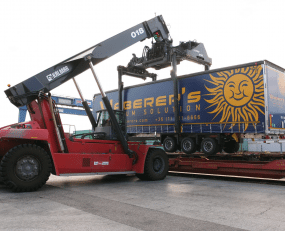
Waberer’s Optimum Solution reported solid 2017 results last week, confirming organic and inorganic growth have propelled its core business units.
Annual group revenues rose 17.8% to €674.4m, with a steeper growth rate recorded in the fourth quarter, when its top line rose 21% year-on-year to €179m.
The bolt-on acquisition of Polish haulier Link contributed to the rise in many key financial metrics, with a headline-grabbing +163% growth rate in earnings per shares the biggest highlight for the year.
On a reported basis, the Hungarian haulier enjoyed a 57.5% surge in net income to €21.4m, for a net income margin of 3.2%, up 0.8 percentage points on a comparable basis.
Meanwhile, group EBIT and EBITDA rose 16.6% and 37.8%, respectively, to €85.8m and €29.7m, but we witnessed conflicting trends in terms of profitability, with EBIT margin up 60 basis points to 4.4% and EBITDA margin falling 20 basis point to 12.7%.
Chief executive Ferenc Lajkó said the “financial performance surpassed expectations across the board for our shareholders”, adding that strong annual results “demonstrate the successful implementation of our strategy aimed at revenue growth through organic and inorganic expansion, supported by efficiency gains and the adoption of cutting-edge technologies”.
He said 2017 was an important year due to its long-awaited IPO in July, which aimed to release value from its two pillars: International Transportation and Regional Contract Logistics (RCL).
Core international transportation revenues last year were up 13.3% to €511m, boosting gross profit. Costs rose but were well managed, determining a rise in unit EBITDA to €61.6m, although the associated EBITDA margin dropped 0.5 percentage points to 12%. Meanwhile, RCL revenues came in at €124m, generating €17.3m of EBITDA.
Group operating cash flow also rose, although rising investment meant free cash flow was marginally lower at €74.8m, while cash outflows from investing and financing activities increased to €57m due to the “Link acquisition and higher total lease payments on an enlarged fleet, as well as higher capital expenditure for IT solutions, which were not fully offset by IPO proceeds”.
Cash and cash equivalents grew by €27m annually, while net financial indebtedness and net leverage are under control and remain financial tools that management plans to use to preserve competitiveness and returns.
The company said net leverage – a multiple of rolling recurring EBITDA which includes Link’s figures from 1 July 2017 – decreased to 2.7x from 2.9x a year earlier, versus 3.4x at the end of September. Fleet refinancing costs remained below a 1.7% implied rate, it noted.
The marginal improvement notwithstanding, its funding plans remain under the spotlight.
Following recent speculation that it was considering an “ABB/follow-on offering, as stated in the IPO prospectus”, the company said it had agreed with its IPO arrangers that for a year after the first day of trading it would not conduct “any capital raising through the issuance of new shares”, and has concluded not to issue new shares or conduct capital raising in the near future.
Source: Transport Intelligence, March 13, 2018
Author: Alessandro Pasetti